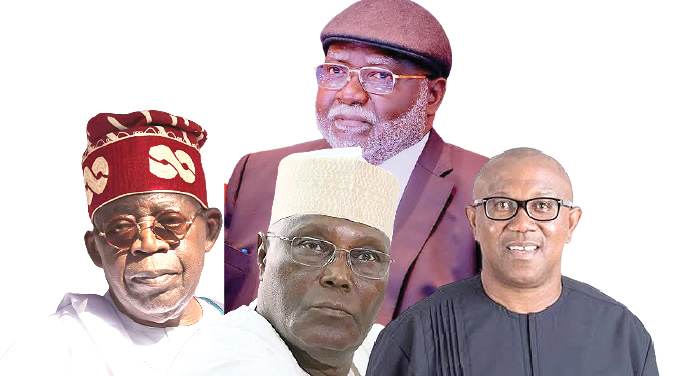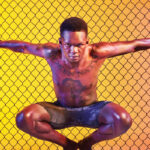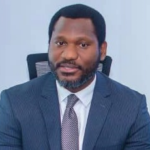
Following the recent removal of the ‘All eyes on the Judiciary’ billboard in the Federal Capital Territory, DIRISU YAKUBU examines the controversy surrounding the action, which has been perceived by some stakeholders as mounting pressure on the Presidential Election Petition Tribunal ahead of the ruling on the February 25 presidential election
Never in the nation’s electioneering history has the judiciary courted attention like it is doing presently. Seen as the last hope of the common man, the judiciary has been commended and condemned in equal measure depending on the popularity or otherwise of its decision at any given time since the return to a democratic mode of government in 1999. The issues at the moment are two petitions filed by the Peoples Democratic Party, and the Labour Party and their presidential candidates in the February 25 election, Atiku Abubakar and Peter Obi, respectively.
As rightly predicted by political commentators, the presidential race lived up to its three-horse race tag as the trio of Bola Tinubu, Atiku and Obi breasted the tape in first, second and third place finish in that order with the Independent National Electoral Commission declaring Tinubu the winner of the poll after garnering a total of 8,794,726 votes to see off competition from Atiku (6,984,520) and Obi, who garnered a total of 6,101,533 votes.
However, neither Atiku nor Obi accepted the outcome of the election, citing alleged non-compliance with the Electoral Act, 2022, which provides for the electronic transmission of election results to INEC’s viewing portal in real-time, among others.
And despite pleas from eminent Nigerians, including the Sultan of Sokoto, Sa’ad Abubakar III, to accept the outcome of the election, both men filed their petitions and vowed to walk the entire legal distance to prove that the election was fraudulently conducted.
Submissions (written and oral) have been made by both parties and the election tribunal is now on the verge of giving its ruling. But last week, a dramatic twist occurred when billboards bearing the inscription, ‘All eyes on the judiciary’ mounted at strategic locations in the Federal Capital Territory drew Nigerians’ attention to a sustained pressure on the learned justices of the election tribunal to dispense justice on the matter without fear or favour.
Before now, Atiku’s loyalist and Director of Planning and Strategy of the PDP Presidential Campaign Council, Don Pedro-Obaseki, had in several media outings called on the judges to remember that the eyes of the world were on them. This was even as he claimed that Atiku’s team monitored actual voting nationwide on satellite, insisting that results collated and announced in favour of Tinubu were altered in some states of the federation against the PDP presidential candidate.
Encouraged by an army of netizens led by a Twitter (X) group, ‘Violence Space’, Obi is convinced that the litany of controversies surrounding Tinubu coupled with identified gaps in the election that brought him to power is enough for the tribunal to either declare Obi the winner or in the alternative, order a re-run. The former Anambra State governor, the only candidate to secure over 25 per cent of votes cast in the FCT, also believes that the failure of Tinubu and Atiku to demonstrate sufficient popularity in the nation’s capital, places him in the driver’s seat to Aso Rock.
As it were, the panel is under tremendous pressure to do its job, arguably because in the past, some decisions taken on electioneering matters did not sit well with millions of Nigerians. The 2020 controversial Supreme Court judgment that declared Hope Uzodimma as the winner of the 2019 Imo State governorship election readily comes to mind.
Recall that in its Nigeria Corruption Index Report (2018-2020), the Independent Corrupt Practices and Other Related Offences Commission, ranked the judiciary top in the ignoble list, with about N9.457bn said to have exchanged hands as bribes. In the report, six female judges claimed that they were offered the sum of N3.307bn, while five of their male counterparts said they were offered N392.2m, in what the anti-corruption agency said were cases of outright demand and offer of bribes “mostly linked to election matters.”
The report read, “Overall, the justice sector had the highest level of corruption with a score of 63. The level of corruption in the justice sector was heightened by stupendously high amounts of money offered as bribes to judges by lawyers handling high electoral and other political cases. A large percentage, 73 per cent of justice sector respondents, did not experience a situation of outright demand or offer of a bribe. Nevertheless, it remains alarming that 16 per cent of respondents had experienced such blatant demands or offers of bribes.
“Follow-up discussions indicated that the cases of outright demand and offer of bribes were mostly linked to election matters. Money involved in high-level corruption in this sector was categorised into money demanded, offered or paid. Demands are made by court officials, including judges, while bribe is offered and lawyers or litigants make payments. The total amount of money reported by the justice sector respondents as corruptly demanded, offered and paid between 2018 and 2020 was N9,457,650,000.
“Seventy-eight respondents constituting 8.7 per cent of all justice sector respondents reported offers or payments of bribes to influence the judicial process. Out of the 78 justice sector respondents who reported amounts of money offered or paid, 63 were lawyers. This number makes up 9.9 per cent of all lawyers surveyed in the justice sector. The 63 lawyers that reported payments were mostly male being 69.8 per cent, while their female colleagues constituted 30.2 per cent of that population. In all, the total amount of money reported by lawyers was N5,733,986,000. The amount reported by female lawyers was N918,045,000 while male lawyers reported N4,815,941,000.”
Last week, the Federal Government disbanded the Secretariat of the Advertising Standard Panel due to its endorsement of billboards deemed to have run afoul of ethical values, particularly those with the inscription, ‘All Eyes on the Judiciary’. Since the official order to have the billboards removed, prominent Nigerians have been speaking on the implication of the government’s action, with Atiku describing it as “authoritarianism and an affront to freedom of speech.”
There are reasons too numerous to warrant a recap here to justify Nigerians’ apprehension of possible judicial compromise in the presidential election petition tribunal. Last week, the Chairperson of the Kano National and State House of Assembly Petition Tribunal, Justice Flora Azinge, raised a bribery alarm that there was an attempt to influence a member of the tribunal with money to sway the course of justice the way of the client of a lawyer. In her words, “Money has been flying in the tribunal.”
Speaking with Saturday PUNCH, a Senior Advocate of Nigeria and human rights activist, Mike Ozekhome, said the decision of the Tinubu government to bring down the billboards showed that it was jittery of the unknown.
“What they did with the billboards is bad for democracy. It is shameful for the government and by their conduct, they showed signs of being jittery. What is wrong with saying ‘Eyes on the judiciary?’ What is wrong with our National Assembly? Eating fat and regurgitating when Nigerians are dying of hunger. Nigerians are angry, very angry. They can’t take it anymore. The next weeks and months will be quite testy and demanding. Those who have ears, let them hear. Those who have eyes, let them see. Those who have limbs, let them walk,” he said.
Sharing similar thoughts on the subject matter with Ozekhome is rights activist and constitutional lawyer, Mr Abdul Mahmud. In his words, “Nigerians regardless of the opinion they hold concerning the election, they are at liberty to freely express themselves,” noting that such expressions are guaranteed in a constitutional democracy.
Mahmud, who heads the law firm, Ephesis Lex Attorneys and Solicitors, Abuja, also queried the rationale behind the Federal Government’s decision to dismantle the billboards because of the message they disseminated to the public on the huge expectations of Nigerians from the judiciary.
He said, “The directive that the billboards carrying ‘All eyes on the judiciary’ be pulled down is an executive act taken too far in a constitutional democracy that protects free speech and freedom of expression. What is the harm in the inscription that the government dreads? I don’t understand what pricks the scrotal part of this government when judicial watch remains one of the cornerstones of constitutional democracy.
“I have consistently argued that judges are humans and are prone to such abuses that sometimes implicate competence, ethical conduct and corruption; and it is for this reason that institutional judicial and non-institutional watchdogs exist. Those who oppose citizens’ judicial watchdogs and tear their hairs over ‘All eyes on the judiciary’ don’t appreciate the place of citizens or eternal vigilance in democracy.
“They are the real enemies of our democracy and must be confronted by well-meaning citizens. Compliance with ethical, statutory and regulatory judicial standards cannot be left to institutional watchdogs alone; citizens must serve as watchdogs – and at a time when a judge of the election tribunal sitting in Kano warned that senior lawyers were seeking to bribe the tribunal she chairs.”
But disagreeing with Ozekhome is a former Secretary General for the Arewa Consultative Forum and a chieftain of the All Progressives Congress, Anthony Sani, who said the Federal Government was right to order the removal of the billboards. According to him, mounting the billboards in the first instance was an attempt to frighten the judiciary from performing its duties, stressing that the government was right by protecting its third arm from undue intimidation.
He said, “What is the meaning of ‘All eyes on the judiciary?’ Were the billboards meant to frighten the judiciary? I do not think it is right for a vested interest to cast aspersions and make people lose faith in our democratic institution.”
The presidential candidate of the African Democratic Congress, Dumebi Kachikwu, in his submission, aligned himself with Sani, arguing that though bad eggs exist in the judiciary; the sacred arm of government must be protected from the antics of those bent on bringing their intimidating acts to bear on it.
He said, “I am in support of the decision to pull down the billboards. Whereas we have some bad eggs in the judiciary, our actions and words as a people must not be seen to intimidate the judiciary in any way. This is what the slogan ‘All eyes on the judiciary’ implies. We must have faith in the process if we have subjected ourselves to the process. If you have no faith in the judiciary, you need not go to court.”
According to Kachikwu, Nigerians must brace for the judgment of the election panel, stressing that if it rules in favour of President Tinubu, it will not translate to mean that the learned justices were compromised. That said, Kachikwu added that Atiku and Obi were products of flawed elections in the past even as he questioned their moral right to seek to upturn the outcome of an election they believed to have been poorly conducted.
“We can’t create this notion that any victory for President Tinubu in the courts automatically means the judges are compromised. This is unacceptable! I will reiterate for the umpteenth time that we had flawed presidential elections but all those before the courts right now rigged the elections in one way or the other. This is our reality. He who seeks equity must come with clean hands. Our sad reality as a nation is that none of them has come with clean hands,” he added.
Also pitting her tent with those who believe the government was right in ordering the removal of the billboards, good governance advocate and founder of Women Arise, Joe Okey-Odumakin, told our correspondent that every step must be taken to protect the judiciary from undue harassment and intimidation.
She said, “The billboards and other social media tactics designed to intimidate the judicial process are very unfortunate. We have seen the picture of a judge and his family posted with the clear intent of threat. It reminds me of mafia methods. If democracy is to be entrenched, the billboards need not only be removed, but all threats to the process from every quarter should be resisted. There is something called the tyranny of the minority too.”
However, as Nigerians await the tribunal’s ruling, it is imperative on the part of both the government and the petitioners alike to keep an open mind and be ready to accept the outcome regardless of where the pendulum swings. The law does not pander to emotions but facts and evidence. It is the expectation of the world that the learned justices will be guided by a sense of patriotism in this assignment capable of making or breaking the very soul of the Nigerian state in the weeks ahead.




